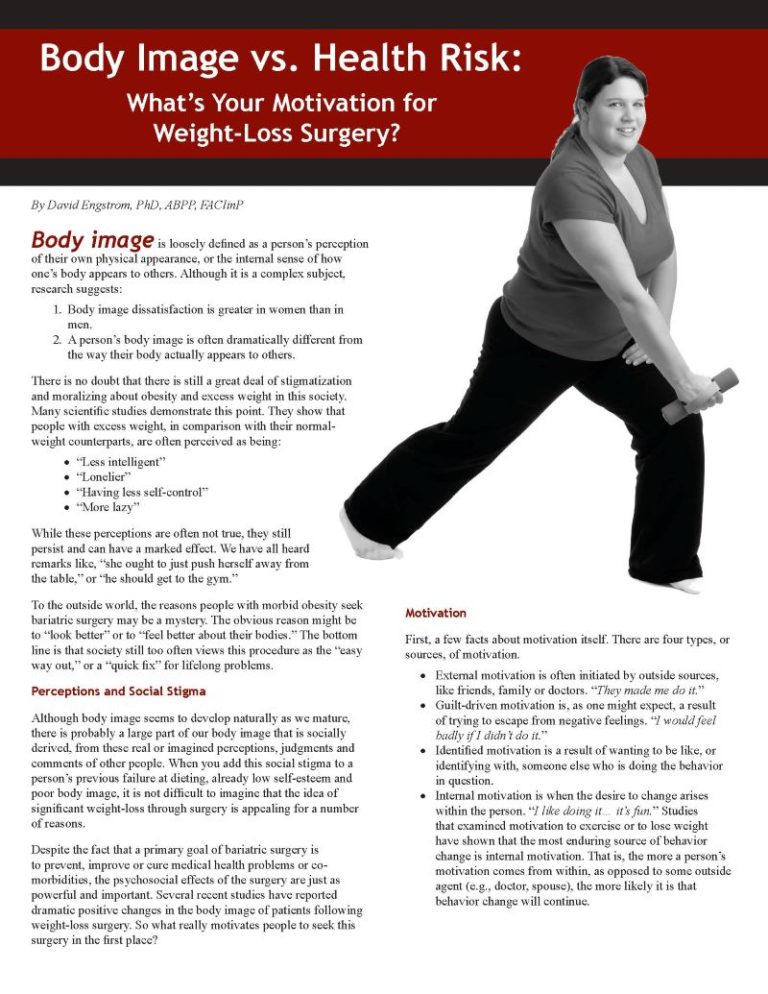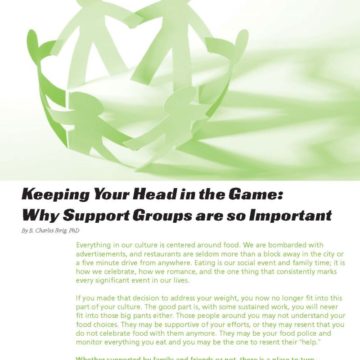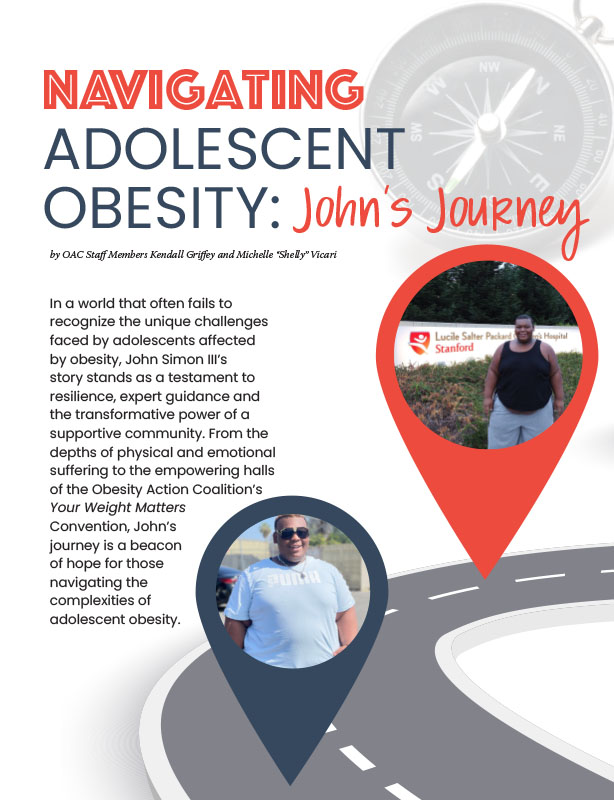Body Image vs. Health Risk: What’s Your Motivation for Weight-loss Surgery?


By David Engstrom, PhD, ABPP, FAClinP
Summer 2008
Body image is loosely defined as a person’s perception of their own physical appearance, or the internal sense of how one’s body appears to others. Although it is a complex subject, research suggests:
- Body image dissatisfaction is greater in women than in men.
- A person’s body image is often dramatically different from the way their body actually appears to others.
There is no doubt that there is still a great deal of stigmatization and moralizing about obesity and excess weight in this society. Many scientific studies demonstrate this point. They show that people with excess weight, in comparison with their normal-weight counterparts, are often perceived as being:
- “Less intelligent”
- “Lonelier”
- “Having less self-control”
- “More lazy”
While these perceptions are often not true, they still persist and can have a marked effect. We have all heard remarks like, “she ought to just push herself away from the table,” or “he should get to the gym.”
To the outside world, the reasons people with morbid obesity seek bariatric surgery may be a mystery. The obvious reason might be to “look better” or to “feel better about their bodies.” The bottom line is that society still too often views this procedure as the “easy way out,” or a “quick fix” for lifelong problems.
Perceptions and Social Stigma
Although body image seems to develop naturally as we mature, there is probably a large part of our body image that is socially derived, from these real or imagined perceptions, judgments and comments of other people. When you add this social stigma to a person’s previous failure at dieting, already low self-esteem and poor body image, it is not difficult to imagine that the idea of significant weight-loss through surgery is appealing for a number of reasons.
Despite the fact that a primary goal of bariatric surgery is to prevent, improve or cure medical health problems or co-morbidities, the psychosocial effects of the surgery are just as powerful and important. Several recent studies have reported dramatic positive changes in the body image of patients following weight-loss surgery. So what really motivates people to seek this surgery in the first place?
Motivation
First, a few facts about motivation itself. There are four types, or sources, of motivation.
- External motivation is often initiated by outside sources, like friends, family or doctors. “They made me do it.”
- Guilt-driven motivation is, as one might expect, a result of trying to escape from negative feelings. “I would feel badly if I didn’t do it.”
- Identified motivation is a result of wanting to be like, or identifying with, someone else who is doing the behavior in question.
- Internal motivation is when the desire to change arises within the person. “I like doing it…it’s fun.” Studies that examined motivation to exercise or to lose weight have shown that the most enduring source of behavior change is internal motivation. That is, the more a person’s motivation comes from within, as opposed to some outside agent (e.g., doctor, spouse), the more likely it is that behavior change will continue.
It is clear that there are many sources for motivation, and they should be examined carefully, especially when the subject is weight-loss surgery.
At our practice, we have examined the motivating factors for a group of 65 of patients who were seeking bariatric surgery. They were each asked about their primary motivating factors, including:
- Health concerns, including medical co-morbidities
- Improvements in self-esteem, including feelings of self-worth and enhanced body image
- Increasing physical functioning, including better mobility and ability to accomplish physical tasks
- Business or job advancement
- Increased social attractiveness
They were asked to rank-order their reasons for seeking surgery, from 1 (most important) through 5 (least important). The results of this assessment are shown below.
What is your most important reason for seeking bariatric surgery?
| Health Concerns | 62% |
| Increase Physical Functioning | 11% |
| Improve Self-esteem | 19% |
| Business or Job Advancement | 5% |
| Social Attractiveness | 3% |
One clear finding here is that health concerns far outweigh all other categories of motivation for bariatric surgery. These may represent either current or future concerns about physical health and well-being. When motivation to improve physical functioning is added to health concerns, the total for both represents nearly three quarters of all primary reasons.
Body Image and Self-esteem
Although “body image” was not a separate category, it is assumed that this issue is incorporated into the categories of “improve self-esteem” and “social attractiveness.” Together, these two areas were primarily endorsed by 22 percent of the respondents.
People obviously choose to have bariatric surgery for many reasons, and these cannot easily be broken down into distinct categories. While our data suggests that health concerns are well in front of other reasons, there were secondary reasons, including body image, which play a part in their decision-making as well.
Of equal importance is the person’s source of motivation. Be sure to examine yours, and make certain the decision is an internal one!
About the Author:
David Engstrom, PhD, ABPP, FAClinP, is a clinical health psychologist, board certified in Clinical Psychology. He is a psychologist at Scottsdale Bariatric Center. Dr. Engstrom is an active member of the American Society for Metabolic and Bariatric Surgery and currently serves on the OAC Advisory Board.
by Robyn Pashby, PhD Winter 2024 “No one is ever going to date you if you don’t…
Read Articleby Leslie M. Golden, MD, MPH, ABOM Diplomate Winter 2024 The journey to overcoming obesity is a…
Read Articleby OAC Staff Members Kendall Griffey and Michelle “Shelly” Vicari Winter 2024 In a world that often…
Read Article









